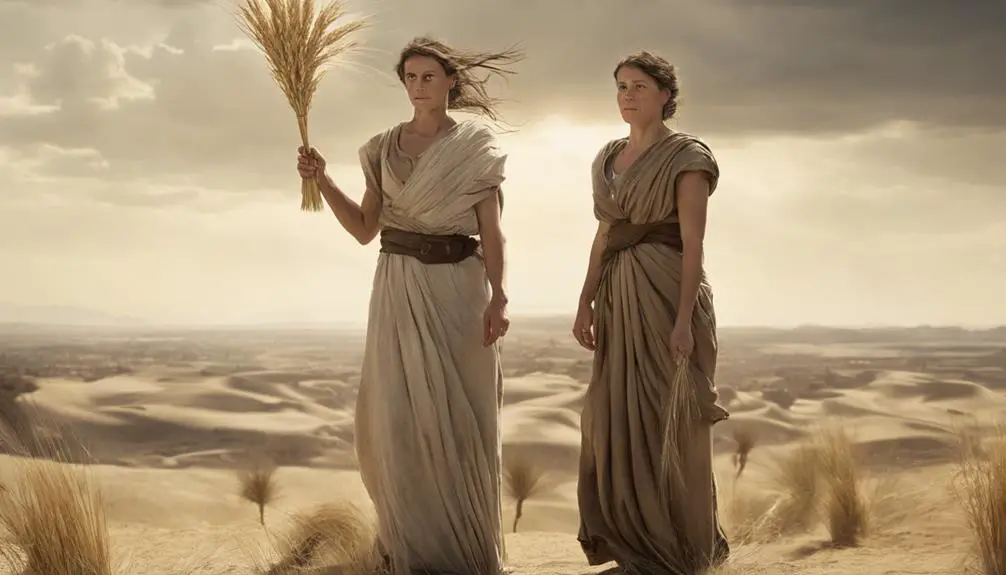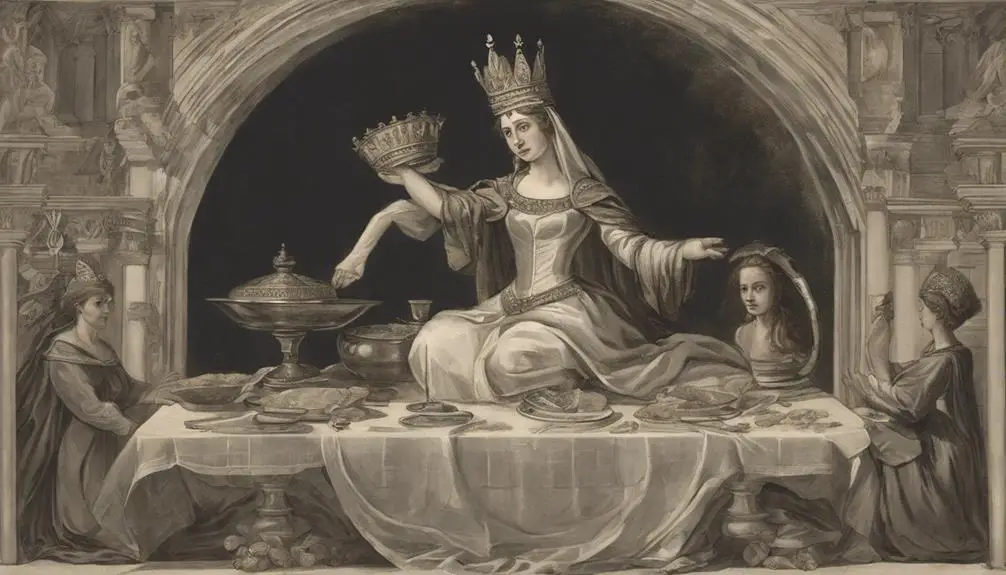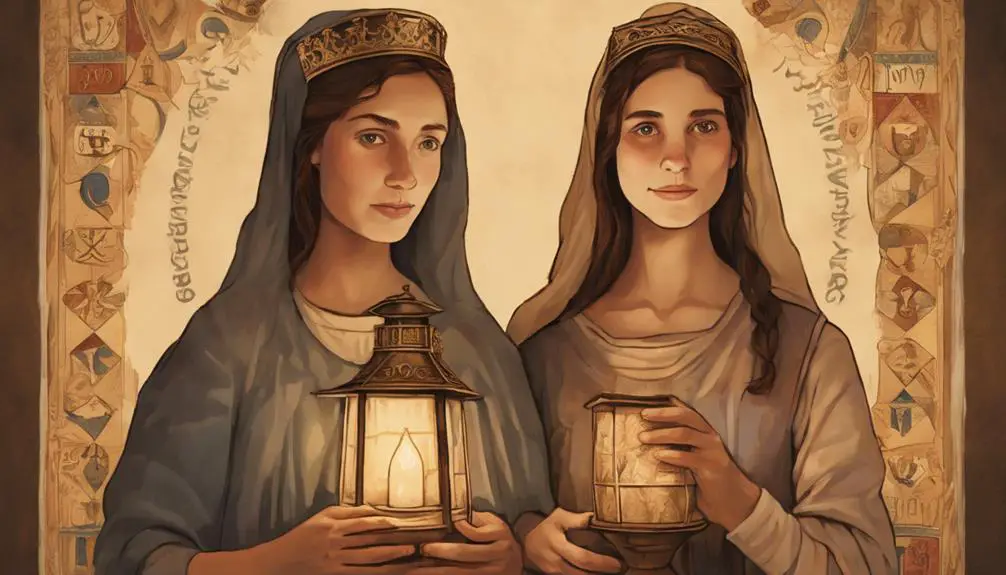Mingle with Esther and Ruth's inspiring biblical journeys, where faith, loyalty, and courage sculpted the spiritual landscape we traverse today.

Esther and Ruth in the Bible
You may not be aware, but Esther and Ruth, two prominent figures in the Bible, are the only women to have entire books named after them. These women's narratives provide compelling lessons on faith, loyalty, and courage.
Wouldn't you like to explore how their extraordinary lives, lived in vastly different historical and social contexts, converged to shape and influence the spiritual landscape we navigate today? Their stories might just inspire you in ways you've yet to imagine.
Key Takeaways
- Esther and Ruth are the only women with biblical books named after them, highlighting their importance in biblical narratives.
- Their stories demonstrate unwavering loyalty, selfless sacrifice, and courageous faith, setting them apart as biblical heroines.
- The narratives of Esther and Ruth contain teachings of leadership, selflessness, faith, and divine intervention, providing wisdom relevant today.
- As beacons of female empowerment, Esther and Ruth continue to inspire discussions on women's roles and influence in society.
Ruth's Unwavering Loyalty

Often exemplified in biblical narratives, Ruth's unwavering loyalty to her mother-in-law Naomi dramatically underscores her character, and this devotion plays a pivotal role in their shared story. Ruth's maternal relationship with Naomi, despite not being her biological mother, is a testament to her exceptional commitment and resilience.
Ruth's decision to cleave to Naomi, even after the death of her husband, is a clear demonstration of her loyalty. You see this when she declares, 'Where you go, I'll go; where you lodge, I'll lodge; your people shall be my people, and your God my God.' This declaration profoundly reveals her intent to maintain their maternal relationship, even at the cost of her own prospects.
Boaz's perception of Ruth is significantly influenced by her loyalty to Naomi. He commends her for not seeking younger men, whether rich or poor, showing his appreciation of her character. This perception is instrumental in his decision to marry Ruth, a foreigner, which ultimately leads to her becoming the great-grandmother of King David. Ruth's unwavering loyalty, then, not only defines her relationship with Naomi but also shapes her future, illustrating the powerful influence of steadfast devotion.
The Selfless Sacrifice of Esther

In the annals of biblical heroines, you'll find Esther, a woman whose selfless sacrifice stands apart, shedding light on her remarkable courage and compelling sense of duty. Esther's courage, a product of her strong faith, transforms her from a simple Jewish girl to a queen who saves her people.
As an orphan raised by her cousin Mordecai, Esther's life changes dramatically when she's chosen to be the queen of Persia. Yet, she doesn't let her royal influence change her humble origins or staunch faith. Instead, she uses it as a platform to protect her people, the Jews, from an impending massacre.
When Mordecai informs her of a plot to annihilate the Jews, Esther's courage surfaces. She risks her life by approaching the king uninvited – an act punishable by death – to plead for her people's salvation. Her selflessness shines as she puts her community's welfare before her own safety.
This tale of Esther's courage and selfless sacrifice underscores her unique role in biblical history. It's a testament to her strength, fortitude, and unwavering determination, reminding us of the profound impact one person's sacrifice can make.
Comparing Ruth and Esther's Faith

Drawing a parallel between Ruth and Esther, one can't help but notice the remarkable similarities in their faith, which served as the bedrock of their actions and decisions. You'll find that their faithful courage in the face of adversity set them apart. Ruth, a Moabite widow, chose to follow her mother-in-law Naomi back to Bethlehem, expressing her devotion to Naomi's God. Esther, a Jewish queen in a foreign land, risked her life to save her people from annihilation. Both demonstrated their faith in God, trusting in divine interventions even when the odds seemed insurmountable.
To better understand these similarities, consider the following table:
Ruth |
Esther |
|
|---|---|---|
Faithful Courage |
Left her homeland to follow Naomi |
Risked her life to save her people |
Trust in God |
Devoted herself to Naomi's God |
Trusted God would save her people |
Divine Interventions |
Found favor with Boaz |
Found favor with King Xerxes |
Outcome |
Became great-grandmother of King David |
Saved her people from destruction |
Their stories aren't about passive faith, but about active, courageous faith that trusts in God's providence. They were women of action, guided by their unwavering belief in God's promises.
Life Lessons From Esther and Ruth

Countless life lessons can be gleaned from the inspiring stories of Esther and Ruth, each offering wisdom that's as relevant today as it was in biblical times. Esther's tale exemplifies Courageous Leadership, as she risked her life to save her people. You learn from her the importance of standing up for what's right, even when the stakes are high. This implies the value of selflessness, bravery, and strategic thinking in leadership.
Ruth, on the other hand, depicts Divine Intervention through her loyalty and devotion. Her unwavering faith leads to unexpected provision and protection, teaching you that life's circumstances aren't merely coincidental but often divinely orchestrated. This encourages you to persevere through hardship, trusting in a higher power's plan.
In analyzing these narratives, you'll find that Esther and Ruth's stories aren't just historical accounts, but timeless lessons woven into the fabric of humanity. Their examples of courage and faith provide a blueprint for navigating life's challenges. Through them, you learn the power of conviction, the importance of humility, and the transformative potential of Divine Intervention.
Esther and Ruth's Contemporary Relevance

While you glean life lessons from Esther and Ruth's narratives, it's also crucial to recognize their enduring relevance in contemporary society, particularly in the spheres of Women's Empowerment and Biblical Feminism.
Esther and Ruth, through their unique stories, serve as beacons of female strength and resilience. Esther's audacious courage and political savvy, used to save her people, echoes in modern dialogues on women in leadership. Her story underscores that women's empowerment isn't simply about self-assertion; it's also about utilizing one's influence for the betterment of society.
Ruth, on the other hand, is a testament to unwavering loyalty and the audacity to defy societal norms. Her narrative is a cornerstone of Biblical Feminism, demonstrating that women's roles aren't confined to traditional expectations. Ruth chose her path, sought her destiny, and in doing so, became an integral part of a lineage that would lead to the birth of a King.
Frequently Asked Questions
What Are the Historical Contexts in Which the Stories of Esther and Ruth Are Set?
You're delving into historical contexts of two narratives.
Esther's courage shines in the Persian Empire's court, highlighting Jewish challenges under King Ahasuerus.
Ruth's loyalty, on the other hand, is set in the backdrop of Israel's period of Judges, exploring themes of faithfulness amidst famine and loss.
With these stories, you're not just exploring history, but also the resilience of characters who navigate their complex periods, reflecting their respective societal norms and issues.
How Are the Characters of Esther and Ruth Portrayed in Other Religious Texts, Outside the Bible?
You'll find that outside the Bible, Esther's influence and Ruth's loyalty are still highlighted in other religious texts. Esther is often depicted as a powerful queen using her position wisely, while Ruth is a symbol of unwavering loyalty.
The Talmud, for example, provides additional insights into their characters. However, interpretations vary across texts, reflecting different cultural and religious perspectives.
Are There Any Archaeological or Historical Evidences That Support the Existence of Esther and Ruth?
While there's no direct archaeological evidence supporting Esther's influence or Ruth's loyalty, it doesn't mean they didn't exist. Historical records don't always reflect every individual's existence, particularly women in ancient times.
Still, their stories have had profound impacts, suggesting they could be based on real figures. However, without definitive archaeological evidence, it's an area of historical study that remains open to interpretation and further research.
How Have the Stories of Esther and Ruth Been Adapted in Modern Cultural Works Like Films, Books, or Plays?
You've likely seen Esther's influence in feminism and Ruth's legacy in literature, even if you didn't know it. They've been adapted into films, books, even plays.
Esther's defiance has become a feminist icon, inspiring works like 'Hadassah: One Night with the King'.
Ruth's unwavering loyalty is echoed in novels such as 'In the Field of Grace'.
These adaptations keep their stories alive, adapting them to resonate with our modern sensibilities.
How Did the Family Dynamics and Societal Expectations of Their Time Affect the Decisions and Actions of Esther and Ruth?
In your analysis of family dynamics and societal expectations, you'd find these factors heavily influenced decisions and actions.
Gender roles often dictated behaviors, particularly for women. Women's choices were frequently shaped by their societal roles and familial expectations.
Religious persecution also had a significant impact, forcing individuals to make difficult decisions to ensure survival. This societal pressure often led to unconventional actions, as survival necessitated adaptation.
Conclusion
In conclusion, you've explored the lives of two remarkable women, Esther and Ruth. Their stories, steeped in faith, sacrifice, and loyalty, serve as timeless examples. You've compared their faith, analyzed their actions, and drawn vital life lessons.
They hold contemporary relevance, reminding us of the power of resilience, courage, and commitment. Their stories, though ancient, continue to resonate and inspire, reiterating the impact of steadfast faith and selfless love.



Sign up